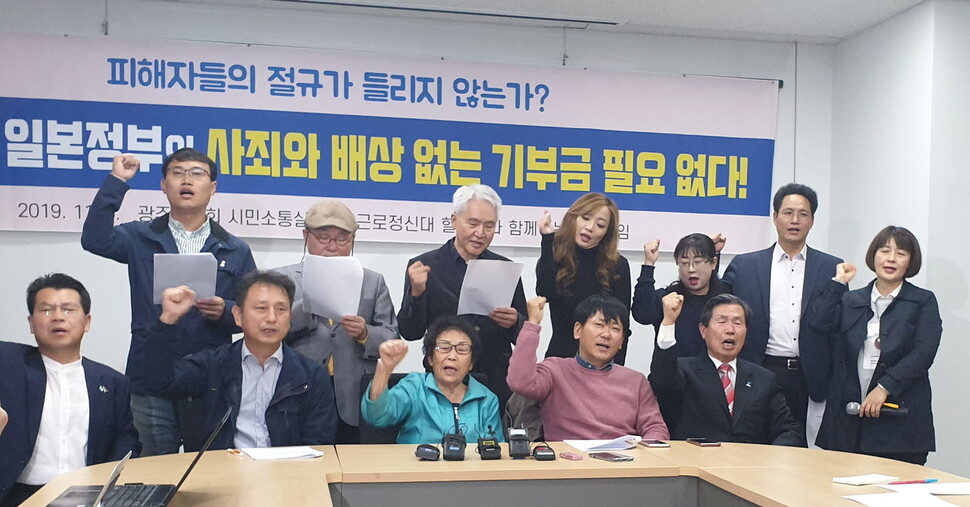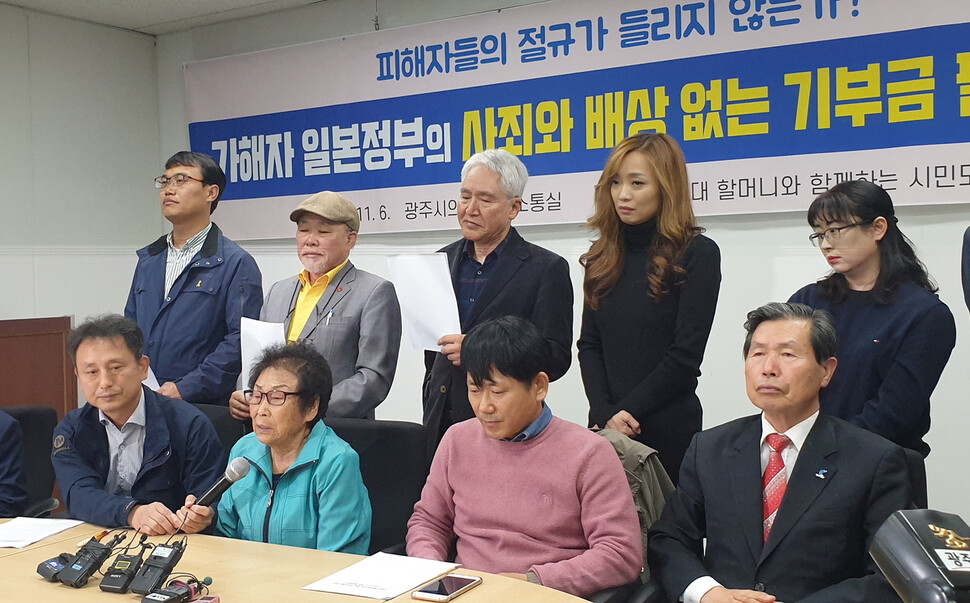hankyoreh
Links to other country sites 다른 나라 사이트 링크
Forced labor and comfort women victims up in arms over Moon Hee-sang’s compensation proposal

Forced labor mobilization and comfort women survivors are up in arms over National Assembly Speaker Moon Hee-sang’s proposal to raise funding through contributions from South Korean and Japanese businesses and the public and from a “comfort women fund” as a solution for compensation of survivors of forced mobilization by imperial Japan. The controversy is intensifying in South Korea rather than in Japan amid arguments that the plan was suggested hastily amid the pending termination of the two sides’ General Security of Military Information Agreement (GSOMIA), scheduled for midnight on Nov. 23.
During a lecture at Japan’s Waseda University on Nov. 5 and in a talk with South Korean correspondents in Tokyo on Nov. 6, Moon said he planned to pursue legislation to create a fund to comprehensively resolve both the forced labor and comfort women issues. Key to Moon’s augmented “one plus one” proposal is the plan to cover Japanese companies’ responsibility for compensation with voluntary contributions from South Korean and Japanese businesses and the public, along with the 6 billion won (US$5.17 million) remaining of the 1 billion yen (US$9.2 million) contributed by Japan to the Reconciliation and Healing Foundation, which was established through a 2015 agreement between the South Korean and Japanese governments but subsequently disbanded. The idea is to resolve the issue through a “consent by judgment” approach where the payment of compensation to survivors from those funds is regarded as a subrogation of the Japanese companies’ compensation responsibility.
When asked whether the matter had been discussed with the South Korean government, Mono replied, “They are most likely aware.” But the Democratic Party’s stance has been cautious. An official with the party said the proposal “is not based on an agreement with our party.”
“There need to be discussions with the government to consider the whole picture as we move forward -- including what the mood is like in Japan and whether the victims and public agree,” the official said. Forced labor and comfort women victims have voiced serious concerns, as have experts. The Gwangju-based civic group Citizens’ Forum for Halumni held a press conference on Nov. 6 in the citizens’ communication center of the Gwangju Metropolitan City Council in the city’s Chipyeong neighborhood to call on Moon to quickly withdraw his fund establishment plan.
“In the past, the public has been outraged by the attempts to paper over historical issues with the Asian Women’s Fund, which drew an outcry over the attempt to pay money from a private fund to Japanese military comfort women victims in 1995, and with the 1 billion yen (US$9.2 million) accepted without any apology [from Japan] in 2015,” the group said.
“This idea that it is enough simply to give money to the victims simply repeats the mistakes of the past and is unspeakably awful,” it added.
Lee Guk-eon, a representative for the group, said Moon “draws no distinction between resolving the forced labor mobilization issue and helping out flood victims or other unfortunate neighbors."
“His remarks were extremely insulting to the victims and sought to harm the dignity that they have succeeded in preserving,” Lee said.

No guarantee that Japanese companies would pay contributions
In a statement the same day, the group Korean Council for Justice and Remembrance for the Issues of Military Sexual Slavery by Japan demanded an apology, declaring that the “idea of considering only the position of the perpetrator country’s government in the name of ‘improving Korea-Japan relations’ and forming a fund that includes the remaining balance from the Reconciliation and Healing Foundation is completely unacceptable.”
Yang Kee-ho, a professor of Japanese studies at Sungkonghoe University, said, “There is no guarantee that South Korean and Japanese companies will pay contributions, and members of the public have no cause for paying the money when there has been a Supreme Court ruling on the matter.” “The survivors will never agree to it either,” he predicted.

Politicians should speak with victims rather than rushing solution
Some observers are arguing that politicians should take time to seek out a resolution through discussions with the victims rather than hurrying to come up with a solution under pressure from the US, which is calling for GSOMIA’s extension. Jeong Hye-gyeong, a research fellow with the Peace Research Association on Imperial Japanese Forced Labor Mobilization, said, “Things like forced labor mobilization are not the kind of issues that you respond to on an ad hoc basis.”
“Japan is going to feel uncomfortable as the South Korean government fulfills its responsibility to the end, moving forward with its investigation and giving compensation to the victims. And in the process, we develop more bargaining strength,” she stressed.
Kim Sook-hyun, director of the external strategy research office at the Institute for National Security Strategy, said, “GSOMIA will end as a rule unless there is a change in attitude from Japan, and the forced labor mobilization issue is something that will need to be resolved over time through several meetings with the survivors to hear their opinions.” The Japanese government was also reported to have reacted negatively to Moon’s proposal. The NHK network quoted a Japanese government official as saying, “This is predicated on Japanese companies paying costs, which Japan cannot accept, as we have been saying to date.”
By Kim So-youn, Park Min-hee, Kim Yong-hee, and Kim Won-chul, staff reporter
Please direct comments or questions to [english@hani.co.kr]

Editorial・opinion
![[Column] Season 2 of special prosecutor probe may be coming to Korea soon [Column] Season 2 of special prosecutor probe may be coming to Korea soon](https://flexible.img.hani.co.kr/flexible/normal/500/300/imgdb/original/2024/0426/3317141030699447.jpg) [Column] Season 2 of special prosecutor probe may be coming to Korea soon
[Column] Season 2 of special prosecutor probe may be coming to Korea soon![[Column] Park Geun-hye déjà vu in Yoon Suk-yeol [Column] Park Geun-hye déjà vu in Yoon Suk-yeol](https://flexible.img.hani.co.kr/flexible/normal/500/300/imgdb/original/2024/0424/651713945113788.jpg) [Column] Park Geun-hye déjà vu in Yoon Suk-yeol
[Column] Park Geun-hye déjà vu in Yoon Suk-yeol- [Editorial] New weight of N. Korea’s nuclear threats makes dialogue all the more urgent
- [Guest essay] The real reason Korea’s new right wants to dub Rhee a founding father
- [Column] ‘Choson’: Is it time we start referring to N. Korea in its own terms?
- [Editorial] Japan’s rewriting of history with Korea has gone too far
- [Column] The president’s questionable capacity for dialogue
- [Column] Are chaebol firms just pizza pies for families to divvy up as they please?
- [Column] Has Korea, too, crossed the Rubicon on China?
- [Correspondent’s column] In Japan’s alliance with US, echoes of its past alliances with UK
Most viewed articles
- 1The dream K-drama boyfriend stealing hearts and screens in Japan
- 2‘We must say no’: Seoul defense chief on Korean, USFK involvement in hypothetical Taiwan crisis
- 3[Column] Can we finally put to bed the theory that Sewol ferry crashed into a submarine?
- 4[Editorial] Yoon cries wolf of political attacks amid criticism over Tokyo summit
- 5AI is catching up with humans at a ‘shocking’ rate
- 6S. Korea “monitoring developments” after report of secret Chinese police station in Seoul
- 7Doubts remain over whether Yoon will get his money out of trip to Japan
- 8[Photo] “Comfort woman” survivor calls on president to fulfill promises
- 9[Editorial] Was justice served in acquittal of Samsung’s Lee Jae-yong?
- 101 in 5 unwed Korean women want child-free life, study shows